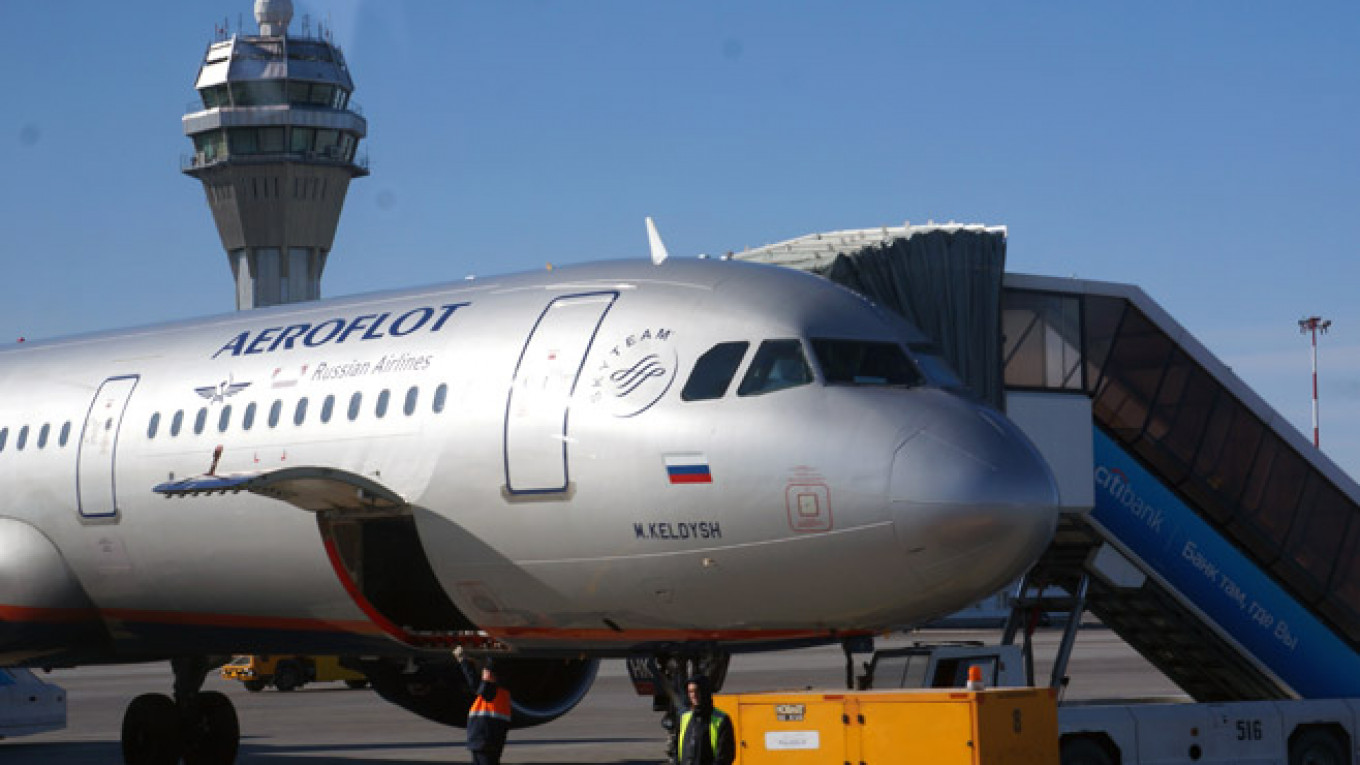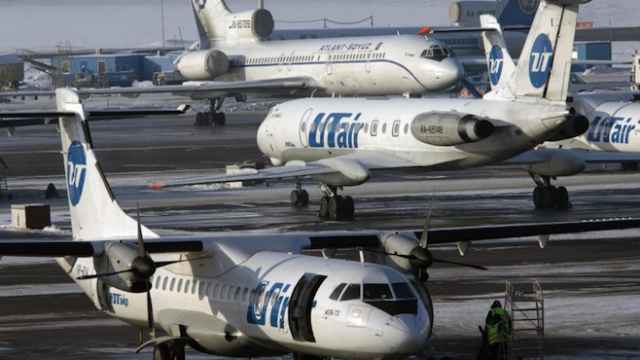Russia's top airlines are eyeing the specter of bankruptcy in 2015 following last year's ruble meltdown, which decimated travel spending and drastically upped the costs of maintaining carriers' fleets.
One of the first rumbles of crisis came in December, when Russia's third-biggest air carrier UTair failed to meet an obligation to repurchase 2.6 billion rubles ($40.8 million) of bonds. The carrier is currently in negotiations to restructure its debt, which totals around 70 billion rubles ($1 billion).
Russia's flagship carrier Aeroflot quickly registered its disapproval of any possible bailout plan, according to newspaper Vedomosti, accusing stricken UTair of being the victim of its own aggressive underpricing. But while UTair's policies may be behind its troubles, the other airlines are familiar with the hazards of the ruble's collapse.
State-owned Aeroflot itself reported a net loss of 3.5 billion rubles ($54.9 million) over the first 9 months of 2014, after a 17 billion ruble profit a year earlier.
In a statement accompanying the results, Aeroflot deputy CEO Shamil Kurmashov attributed the loss to "a sharp decline in the ruble exchange rate versus key foreign currencies, as well as continued weakening of consumer demand and a downturn in the tourism industry."
The ruble sank 40 percent to the U.S. dollar last year amid low oil prices and Western sanctions over Moscow's role in the Ukraine crisis.
Over the January-October period, Aeroflot incurred 14 billion rubles ($219 million) in losses from the currency exchange rate, up from 3.3 billion rubles a year earlier, it said in the report.
Russian airlines' total losses last year are estimated to be at 30 billion rubles ($470 million), a sixfold increase compared to last year according to Vladimir Tasun, president of the Association of Air Transport Operators.
Growth in the number of passengers on Russian airlines, meanwhile, went from 15 percent in 2013 to 8 percent last year for the January-October period, according to the latest available figures from the Federal Aviation Agency.
Some of Russia's leading carriers, including Aeroflot and S7, are strong enough to survive a passenger downturn according to Oleg Panteleyev, editor-in-chief of the AviaPort.ru news agency.
But airlines like Aeroflot and S7 may run into trouble if the ruble continues to stay weak.
Over the last several years, Russian airlines have been expanding their fleet with new U.S. and European-made aircraft, encouraged by double-digit growth in passenger volumes. Those ambitious expansions are now coming back to haunt even financially sound carriers.
Aeroflot's debt soared 41 percent from the beginning of the year, reaching 122 billion rubles ($1.9 billion), due to revaluation of financial airplane lease contracts denominated in foreign currency.
U.S. plane maker Boeing is in negotiations to postpone deliveries of airplanes to Russian companies planned for 2016, John Wojick, Boeing's senior vice president for global sales told news agency Bloomberg at the end of last week.
"Some of the airlines are struggling greatly," he said. "It's really dropped off for them."
In the current situation, government should support the industry, or a series of bankruptcies will follow, analysts said.
While the government has not yet decided whether it should support the troubled UTair, in December the government agreed to extend state guarantees amounting to 9 billion rubles ($140 million) to Russia's second-biggest airline Transaero, which was also facing financial difficulties.
"Help from the government could save the key airlines," said Dmitry Baranov, lead analyst at Finam Management consultancy. "Besides, there is no telling of how the situation will unveil further and whether other airlines [currently not under financial stress] will not require support," he said.
Some airlines are against lending a hand to their competitors in the time of need.
In a letter cited by newspaper Vedomosti late last week, CEOs of Russia's flag carrier Aeroflot and fourth-biggest airline S7 wrote to First Deputy Prime Minister Igor Shuvalov asking him to refrain from helping UTair.
Over the last years, UTair pursued a "policy of aggressive expansion on the growing market while paying no attention to the effectiveness of its business," the executives wrote.
Providing support for UTair now would mean it would "apply even more intensive price undercutting," they said.
While seeking UTair's demise might be just business as usual for its competitors, the complaint also reflects the industry's current squeeze, according to Panteleyev of AviaPort.ru. As economic crisis looms and customers' become scarce, airlines are increasingly wary of being undersold.
Contact the author at a.panin@imedia.ru
A Message from The Moscow Times:
Dear readers,
We are facing unprecedented challenges. Russia's Prosecutor General's Office has designated The Moscow Times as an "undesirable" organization, criminalizing our work and putting our staff at risk of prosecution. This follows our earlier unjust labeling as a "foreign agent."
These actions are direct attempts to silence independent journalism in Russia. The authorities claim our work "discredits the decisions of the Russian leadership." We see things differently: we strive to provide accurate, unbiased reporting on Russia.
We, the journalists of The Moscow Times, refuse to be silenced. But to continue our work, we need your help.
Your support, no matter how small, makes a world of difference. If you can, please support us monthly starting from just $2. It's quick to set up, and every contribution makes a significant impact.
By supporting The Moscow Times, you're defending open, independent journalism in the face of repression. Thank you for standing with us.
Remind me later.






